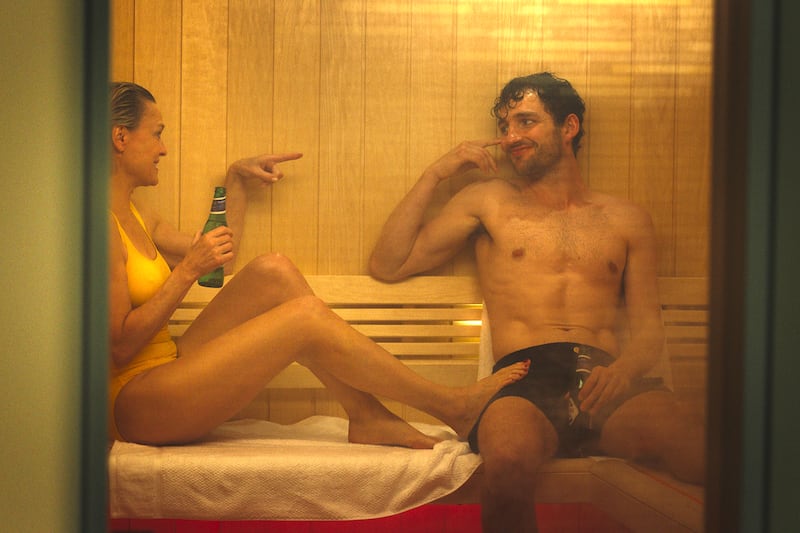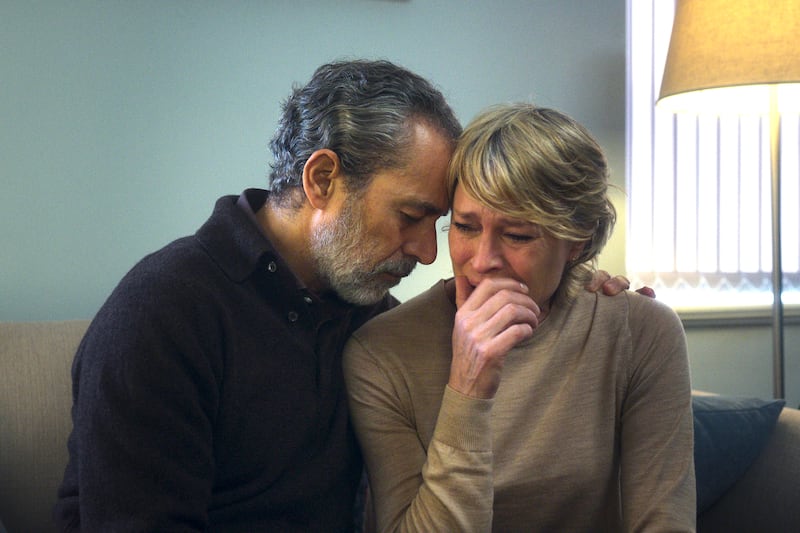What if a stalker thriller had two distinct and noticeably incongruent points of view, blurring the question of who’s stalking who?
That’s the most intriguing idea that springs from this limited series The Girlfriend, an adaptation of the Michelle Frances novel, debuting on Prime Video Sept. 10.
The show sharply divides its episodes between the experiences of Laura (Robin Wright), an American art gallery manager living in London, and Cherry (Olivia Cooke), the British young woman who engages in a whirlwind courtship with Laura’s beloved son Daniel (Laurie Davidson).

Laura and Daniel have a close relationship—seemingly closer and maybe healthier than the one Laura has with her husband Howard (Waleed Zuaiter). As the show begins, it seems as if Laura and Howard have some kind of open marriage, with both of them referring to an unseen girlfriend of Howard’s.
Laura and Howard also had a daughter who died in infancy, leaving Daniel as the primary object of his mother’s attention. That attention also applies to his new girlfriend Cherry, and Laura’s sense that she’s aloof, brazenly sexually forward, manipulative, even duplicitous. After we take in Laura’s impression, the story circles back to Cherry’s point of view, filling in some details that better explain initially dodgy-looking behavior.
This narrative approach continues for much of the six-episode series, though the novelty only lasts for the first two, if that. Once it’s clear that Cherry and Laura both Have Their Reasons for various behaviors and misunderstandings, their separated points of view are characterized by subjectively portrayed disparities in tone.
In Laura’s POV, Cherry is more combative and argumentative. In Cherry’s own view, she is tearier and more emotionally sensitive. There are several scenes where we’re left genuinely unsure which version is “true.”
A better show could have made this a chilling exercise in ambiguity, and there are signs that showrunners Gabbie Asher and Naomi Sheldon do have designs on this sort of even-handed yet unsettling approach. But the story of The Girlfriend hinges on Laura telling a lie so encompassing that it dwarfs Cherry’s most questionable behavior for long stretches.

At some point, it stops mattering whether any of this is intentional misdirection, and The Girlfriend starts to feel like its principal purpose is to jerk the audience around with a series of soapy (and, over six episodes, repetitive) confrontations.
It is admittedly fun to watch Wright and Cooke circle each other, especially early on. Wright shows fearlessness in taking on the less traditionally likable role: the smothering, too-perfect mom with sky-high expectations. What’s more, Wright directs several of the episodes; she sure doesn’t go easy on herself, in addition to regarding Cooke with surprising lasciviousness.
For a while, the show is sex-forward in a way most movie thrillers have sworn off. The thing is, it might be possible to describe The Girlfriend as compulsively watchable at 90 or 100 minutes. Instead, the show feels almost insidiously addictive—stretching out a tawdry story to create an impatient, base form of wanting to know what happens next. It doles out its most Hitchcockian, voyeuristic qualities in order to keep you on the hook for its skim-level social observations.

Yes, apparently the nominal reason to make this a series is to get under its characters’ skin and explore the psychology behind their relentless duel, supposedly rooted in class: Laura’s privilege that she can’t fully acknowledge lest she admit that otherwise she might be considered a failure pitted against Cherry’s ruthless drive to transcend her humble roots, fueled by a sometimes-concealed righteous anger.
All but the most superficial version of these dynamics are ultimately a bit of a feint, telegraphed by what the show vaguely characterizes as a working-class hand-to-mouth existence: Cherry’s mom (Anna Chancellor) runs what seems like her own butcher’s shop and lives in a modest home, while Cherry herself works at a posh real estate office but gets passed over for a promotion. Real hardscrabble stuff.

It may be the characters ultimately making this mistake, rather than the show itself. Nonetheless, it still does the job of narrowing the show’s purview and making the whole thing, from character to setting to thematic ambition, feel like a flimsy construction, rather than anything truly lived in.
That would be fine if the show was more confrontational with its characters’ unflattering desires. But whenever The Girlfriend threatens to fly off the rails, it holds back for the sake of plotting.
Maybe its most unhinged aspect is the soundtrack’s nakedly descriptive needle drops; half the songs have lyric-scene matches like “are you scared of me?” accompanying Cherry asking Laura if she’s scared of her, or “this is my house” accompanying a scene set in, uh, someone’s house.
The fraught hot girl/mother-in-law relationship deserves better than this wannabe cheek. It’s a shame, watching what could have been the cleverest stalker picture in ages, converted into a five-and-a-half-hour sprawl.
The post ‘The Girlfriend’: Robin Wright Is a Sex-Positive, Stalker Mother-in-Law appeared first on The Daily Beast.




